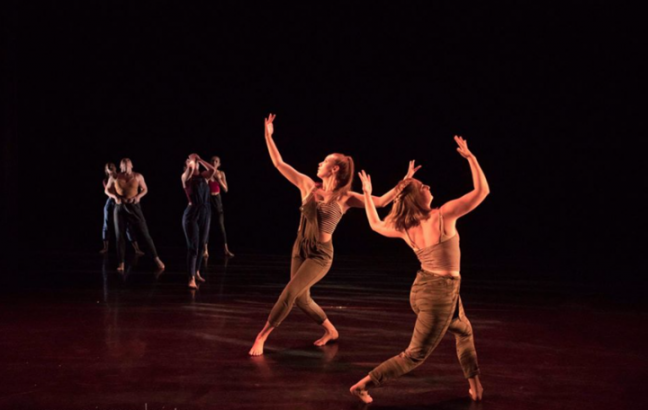It’s 9 p.m. on a Monday night. While many are ending their day, members of Dance Elite are just arriving to practice. They turn on the music and move their bodies in tune with the rhythm and each other. They glide, leap and turn across the dance floor, flowing through the movement in perfect uniform.
Dance Elite is allowed to practice at the Nicholas Recreation Center regularly for no cost because of their relationship with RecWell, according to member Erin Anderson. They also receive university funding for their organization.
Dance Elite is just one of the many student-run dance organizations on campus. But not all of these dance groups receive the same amount of support from the University of Wisconsin. Students are very thankful to be part of these organizations, but sometimes funding and room reservations get complicated for the groups that do not have priority from the university.
Dance Elite is the only student-run dance group that receives university funding. Dance Elite is the original Dance Club team and the only one through the Department of Recreation and Wellbeing. Premiere and Optima are registered student orgs, but not officially recognized as club teams through the university.
Anderson from Dance Elite said they partner with the university and receive priority points for rooms in the Nicholas Recreation Center from volunteering and being timely with forms. Additionally, they charge their members $300-400 per semester. These dues generally go toward their competition fees, costumes and a semester formal.
“We do get a ton of resources, which I’m definitely grateful for, working with RecWell,” Anderson said.
Because Premiere does not receive any funding from the university, they pay all expenses themselves, according to Samantha Pearson, one of the two captains of Premiere. Members pay $115 in dues per semester, which pays for their costumes — any extra goes toward travel and lodging for their one competition each year.
Otherwise, the club raises money through fundraisers. They sell fan shirts and apparel to members and friends. Pearson sometimes wishes they could receive funding from the university, but she said she is thankful for how their fundraisers have brought them together as a team.
Optima also does not receive funding from the university. Erin Pease, the finance and member relations chair, explained they can apply for a grant for about $300-500 to cover specific costs like printing.
Pease said it is important to the organization to make sure anyone can be a part of it, so they keep their dues very low. It is $15 per semester or $25 for the whole year. Dues often go toward renting Shannon Hall as a performance space. They also do fundraisers through partnerships with restaurants and Venmo on Instagram.
Their members can anonymously apply for scholarships if they can’t afford to pay dues, and Optima is very accommodating for people from any financial background. Costumes are a separate cost of $25, but Pease said they can use that same costume every year.
In addition to differences in funding, the access each group receives to practice spaces is very different.
Premiere pays for room reservations at the Nick. Pearson said the organization was able to reduce the cost to reserve these rooms by shortening their practice to an hour and a half and not using the sound system normally provided by the Nick.
Optima Dance, which is a non-competitive dance group at UW, does not use the Nicholas Recreation Center space in an effort to keep their dues very low and to include a variety of members. Optima members pay $15 per semester or $25 for the whole year, according to Pease.
Because Optima collects smaller dues, they cannot afford to reserve space at the Nick. Instead, they reserve rooms at the Wisconsin Union.
“Space reservation is like a ferocious beast,” Pease said.
Optima has 150 members and about 30 dance groups that meet every week, which makes room reservations very complicated. Pease said they are thankful for the Union’s flexibility in accommodating their groups — but the reservation process is still complicated as only certain members of the organization can make reservations for certain days.
But, regardless of the dance group, dancing is worth the complications. Students from each dance group enjoy the environment very much.
Pease said her favorite part about Optima is how diverse and inclusive the organization is. They allow people of any gender, race, major or skill level to join. They even have a no-audition piece which allows everyone to participate.
Additionally, dance is a huge mood booster for her and others, especially when she participated during the pandemic.
“I collectively hear across the board that people look forward to it in their week,” Pease said. “People just love it because it’s the highlight of their night. They get to go through the school day and be glad they have practice afterward.”
Anderson said the girls at Dance Elite are all very motivated.
“Everyone’s always focused on becoming a better version of themselves,” Anderson said.
Anderson loves going to practice and says she doesn’t feel as much pressure as she did in high school. Even though they compete, everyone loves dance and wants to have fun together.
One of Anderson’s favorite memories with Dance Elite was their spring showcase. She enjoyed seeing everyone dance without the pressure of competition. The showcase was unifying, Anderson said, because Premiere performed during the intermission.
Pearson joined Premiere because it offered a low-stress environment. Most women in Premiere dance for fun and to meet people.
“They’re some of my favorite people on campus. Everyone’s so positive and it’s refreshing just to come to dance and let everything else go,” Pearson said.
It’s 11 p.m. on that same Monday. Sweaty and out of breath, but filled with excitement about their accomplishments that night, Dance Elite ends their practice.


